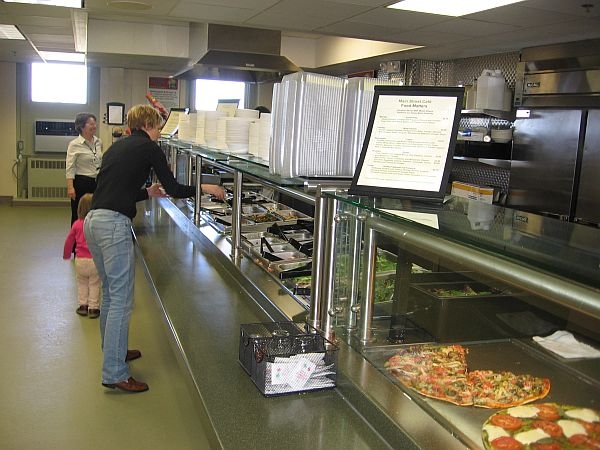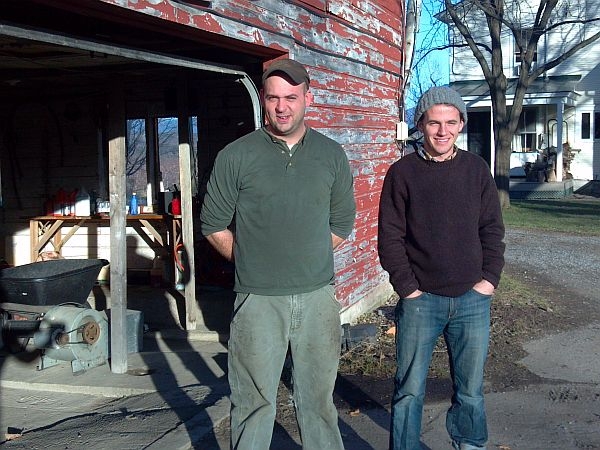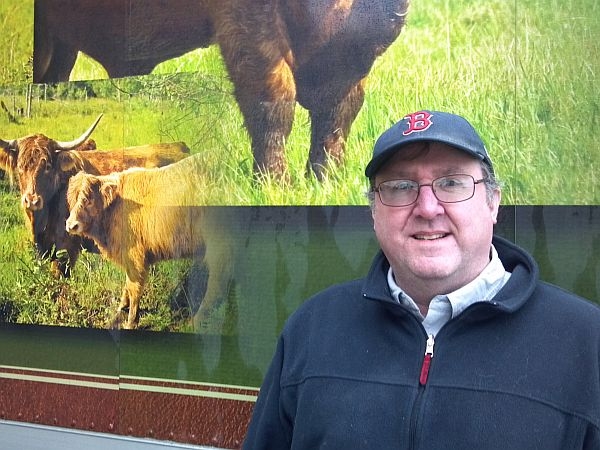
In Vermont, the effort to boost local food production is a priority that’s spelled out explicitly in state law
The Legislature passed the Farm to Plate investment program in 2009. The program aims to create jobs in the farm economy and improve access to healthy, local foods.
Now big institutions are making a difference by creating strong markets for producers.
Fletcher Allen Hospital in Burlington serves about 2 million meals a year. So if you want to see what Farm to Plate looks like in practice, check out a place that puts food on thousands of plates a day.
Diane Imrie, director of nutrition services at the hospital, dodges chefs and workers wheeling stacks of trays as she gives a tour of the bustling kitchen.
"All the cold food is ready to go but it doesn’t come out until they’re preparing the tray," she says.
Under the direction of Imrie and her team Fletcher Allen has embraced local foods as a way to provide healthy meals for patients, staff and visitors.
Purchasing manager Scott Young says local food does often cost more. But he’s confident the expense is worth it.
"Dollar-wise it’s more expensive. But I’ll use ground beef as an example. When you buy a local ground beef, you’re spending a little more for it, but it’s such a peace of mind when you have a recall nation-wide on ground beef and you’re like, ‘Oh, we’re not affected by that because we’re getting a local ground beef.’ I think that alone – the increase in costs just outweighs that," he says.
Young continues the tour and we peek into a room where two chefs are stirring ingredients into huge stainless steel vats.
"This is where we do a lot of our big production cooking in the kettles," he says.
Today’s special is squash and black bean soup – both of the two main ingredients came from local farms. Yesterday, it was corn chowder – again sourced locally, even at this time of year.
"We use corn that’s frozen from Sunrise Orchards. And it’s cool that they access locally and we buy that and that’s available now," he says.
And that’s another way Fletcher Allen has became a key part of the local food system. Because of the institution’s huge demand and its dedication to buying local, the hospital has helped build a market for a new kind of food company.

Sunrise Orchards in Cornwall grows apples. They’re sorted and packed with the help of a machine that separates them by size.
But the orchard has also branched out into a new frozen food venture, built on entrepreneurship and its own distribution network.
David Dolginow is a recent Middlebury College graduate who was hired to help launch the new business. He says Fletcher Allen worked closely on the start-up with orchard owner Barney Hodges.
"In terms of the marketing and distribution side of it, I cannot speak highly enough of Fletcher Allen hospital," Dolginow says. "Diane Imrie encouraged Barney over about a two-year period to think about minimally processed vegetables. And Fletcher Allen has been one of the primary customers from the start."
Sunrise buys fresh corn, beans and other vegetables from farms in Vermont and New York. The produce is quick frozen. Then the same trucks and drivers used to deliver apples also haul the frozen vegetables to customers. Dolginow demonstrates the mobile freezer system.
We have chest freezers that get loaded with – depending on the size – 10 to 18 cases (of vegetables)," he says. "And that takes up one pallet space in the truck. We found that one thing that we’re offering local farms in the area is local frozen distribution."
Sunrise Orchards, the farms it buys from, and the institutions it sells to are part of a statewide local food network promoted by the Farm to Plate program.
Networks like these don’t spring up spontaneously. They take years of planning, an effort coordinated by the Vermont Sustainable Jobs Fund, which was also created by the Legislature.
Fund director Ellen Kahler oversaw the development of the Farm to Plate strategic plan, a detailed document that identifies both opportunities and gaps in the food system. She says one such missing link was filled by Sunrise Orchards.
"They had excess capacity, so they’re looking at storing other types of vegetables and because they’re already trucking they were thinking, ‘Well, if we can truck apples, why can’t we truck other things around?” she says. "So part of the value, I think, of the plan was that it surfaced where these gaps were, where these holes were. And in wonderful Vermont fashion, we have so many entrepreneurs, when they see opportunity they jump on it."
The Farm to Plate plan calls for the state to double the amount of locally produced food, from 5 percent to 10 percent in 10 years.
Purchasing decisions by big institutional customers is a big part of the effort to boost production on local farms. A few hours north of Sunrise Orchards, a beef operation is making inroads with Sodexo, the food service company that supplies the University of Vermont and the state colleges.

Ray Edwards is sales manager for the Vermont Highland Cattle Company. The beef is grass fed on the company’s Northeast Kingdom farms, slaughtered in Troy and then processed at the company’s plant in Orleans.
Edwards is an evangelist for pasture-raised beef. He says the lean meat is low in cholesterol and contains more beneficial Omega-3 fatty acids than corn-fed commodity beef.
Highland Cattle sells a few hundred pounds of beef a week to Fletcher Allen and this fall began selling to Sodexo. The Highland beef is now only available at UVM, but Edwards has high hopes for the Sodexo connection.
"It may not go to every campus in the state. But I think once you’re in the door, it creates an opportunity," he says. "Other campuses can sort of see what’s going on. … I think it just gives you the opportunity to grow."
And that opportunity keeps farmland open in the Northeast Kingdom and employs a dozen people in a growing food enterprise – solid results of farm to plate in action.